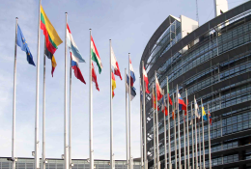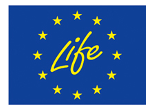LIFE METRO ADAPT
Climate Change Adaptation project
Period: September 2018 – September 2021
European programme of reference: LIFE+
OBJECTIVE
Enhancing climate change adaptation strategies and measures in the Metropolitan City of Milan (MCM).
The project main objectives are:
1. Identifying adaptation strategies and measures in the elaboration process of the MCM Territorial Plan and in the planning and building rules of the 134 MCM municipalities, through an innovative approach identifying intermediate entities of governance (the 7 MCM Homogenous Areas).
2. Promoting Nature Based Solutions (NBS) according to a multi-objectives approach (flood risk and heat-island reduction, together with regeneration of neglected urban space).
3. Enhancing bottom up initiatives increasing the citizen awareness and engagement on climate change adaptation and implementation of demonstrative adaptation facilities, thanks to direct involvement and commitment of local stakeholders working in the building sector and of engineering professionals working in water management.
4. Developing innovative meteorological satellite data and high precision maps supporting detailed vulnerability analysis (focusing in particular on heat islands and floods) for each of the 7 Homogenous Areas, ensuring also the availability of information disaggregated at the municipal level through accessible, updated and possibly open data.
5. Developing a network of Italian and European metropolitan areas enhancing the scope of adaptation policies and measures and supporting the implementation of Nature Based Solutions.
ABSTRACT
The METRO ADAPT project focuses on some of the climate issues addressed in metropolitan urban areas, in particular heat waves, urban heat islands and local flooding due to runoff excess. The effect of heat waves in the urban structure of a wide territory like the Metropolitan Area of Milan is amplified in dense built-up areas (about 40.5% of the whole territory) and by anthropogenic factors such as traffic and other human activities. Moreover, the whole Metropolitan Area of Milan is prone to flood risk, due both to expected increase of peak flow of the Olona and Seveso rivers and to the runoff generated by the compact, not permeable urban fabric. Many European cities and towns, in particular densely urbanized metropolitan areas, are facing these climate challenges. For this reason, cities and towns have been recognised to play a crucial role in the adaptation process across the EU. Climate policy in cities has been supported by the Paris Agreement recognition of cities as key actors in implementation and has been one of the priorities when implementing the EU Adaptation Strategy. Within the new Covenant of Mayors for Climate and Energy, adaptation has been merged with mitigation efforts in a European initiative involving over 7,000 cities around the world.
Consequently, METRO ADAPT will contribute to meet the following priorities:
- developing and implementing local adaptation and mitigation initiatives ('the Covenant of Mayors for Climate and Energy' and 'Mayors Adapt'), including cooperation between local authorities;
- developing and deploying innovative adaptation solutions in urban areas, including in the water, energy and construction sectors;
- promoting and developing green infrastructure in cities, including combating the urban heat island effect, improving permeability of urban surfaces and/or controlling flood risks;
- implementing public-private partnerships.
An adaptation strategy at the local level and a common -well structured- governance will improve the chances for local authorities to exploit potential for cost-effective adaptation, shaping national and regional climate change policies to the local context. Local governments are in a unique position to engage local stakeholders and draw punctual responses to local climate related vulnerabilities and risks. On the other side, individual municipalities do not have the necessary resources (scientific knowledge, administrative competences, funding, etc.) to deal climate problems.
The role of metropolitan cities authorities, such as the Metropolitan City of Milan (134 municipalities including Milano), is fundamental in setting a comprehensive strategy for the wide and whole territory, enhancing the scope of adaptation measures at all the local levels and coordinating all the different planning and operative tools.
The Partners are the Metropolitan City of Milan (Italy, coordinator), ALDA (European association for local democracy, France), Ambiente Italia srl (Italy), CAP Holding S.p.A. (Italy), e-GEOS s.p.a. (Italy), Legambiente Lombardia Onlus (Italy).
Data creazione: Fri Apr 06 17:32:18 CEST 2018


